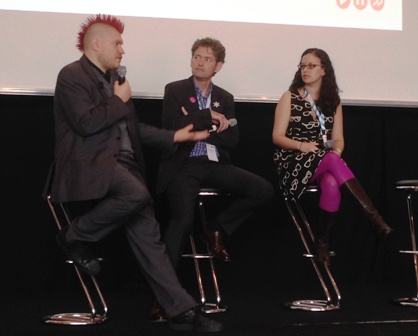 |
|
Sascha Lobo (left) of social reading start up sobooks, Torsten Casimir of the Boersenverein's MVB and Rachel Fershleiser of tumblr discuss the future of bookselling.
|
Prior to the Future of Bookselling panel at Contec, audience members were given small cards with a thumbs-up on one side and a thumbs-down on the other. Sophie Rochester, the panel's moderator and writer for the online magazine the Literary Platform, instructed the audience to use the signs to indicate whether they agreed or disagreed with panelists' statements. The signs were not used until the very end of the panel, when Rochester, playing devil's advocate, proposed that there is no future for bricks-and-mortar bookstores. The response was a sea of thumbs-downs from the audience; all but two attendees disagreed with the statement.
---
Also at the Future of Bookselling panel, tumblr's Rachel Fershleisher, a former employee of Housing Works Bookstore in New York City, discussed the value of indie bookstores: "If we--I still like to think of myself as an indie bookseller--try to compete with Amazon on selection and price and convenience, then we will disappear from the high streets. But that's not what smart bookstores are competing on any more. We provide a different experience and maximize that value to our customers. Events are key, social experiences in store are key, championing small titles are key... those are experiences that small bookstores are not in competition with anyone else."
---
At the Publishers Launch conference, Otis Chandler, CEO and co-founder of Goodreads, which was sold to Amazon earlier this year for an amount rumored to top $100 million, said that a key part of international expansion for Goodreads will be expanding its catalogue. He then intended to say that Amazon had "deep databases" but instead said his new owners had "deep pockets." Amid a lot of laughter, he corrected himself and then noted that Amazon does indeed have deep pockets.
---
Showing a graph of e-book and print book sales in the U.K. over the past several years at a presentation at Publishers Launch, Jonathan Nowell, president of Nielsen Book, pointed out large sales jumps in December for print books while e-book sales showed no particular change. "There is no Christmas in the e-book world," he commented.
---
According to Len Vlahos, executive director of the Book Industry Study Group, speaking at Contec, the U.S. e-book market is still growing, but at a "very, very modest" rate. The growth rate in past years was in the double or even triple digits; it has fallen to the low single digits. E-books, in fact, showed lower growth last year than hardcover books. He did note, however, that more adult fiction books are sold as e-books in the U.S. than in any other format.
---
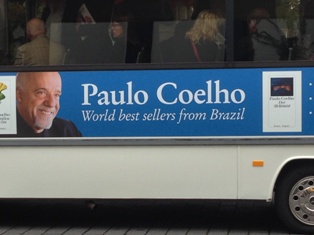 |
| Bus ad promoting author Paulo Coelho |
In protest against the Brazilian government in general and the authors chosen to go to Frankfurt as part of Brazil's guest country program, Paulo Coelho decided at the last minute not to attend the fair. Still, he seemed like the most visible person in Frankfurt: his Swiss publisher, Diogenes, had a series of ads featuring his oversized visage on every of the many shuttle buses that ran between the many fair grounds buildings.
---
At Publishers Launch, Tobias Schmid, head of e-books and e-commerce at Osiandersche Buchhandlung, which has 30 bookstores in 24 southern German cities and the site osiander.de, said that customers have begun to regard the company's site more "as an online shop as opposed to local bookseller with online business." Sales have risen significantly for the chain overall. One particular area of strength: the four stores in the Lake Constance area near the Swiss border, which draws many Swiss citizens who take advantage of the weak euro in relation to the Swiss franc. This comment prompted moderator and conference co-organizer Mike Shatzkin to say that it was odd for an American to hear of Germany being considered a bargain.
---
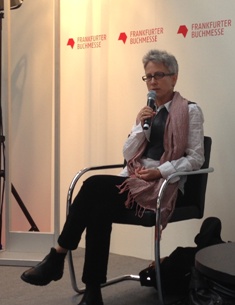 |
| Erika Goldman |
During a panel at the Publishing Perspectives Stage, Erika Goldman, publishing and editorial director of Bellevue Literary Press, discussed what it was like for her to make the transition from a traditional publisher to a small, nonprofit press: "As an editor in mainstream publishing, you are a hub for your authors.... You distribute info into other departments, but other people execute things beyond editorial. All of a sudden I found myself in charge of every aspect of the process, including looking at the bottom line very closely, which is quite sobering. It's bracing and empowering, but it can be demoralizing at the same time. You really have a full vision of the implications of everything you do."
---
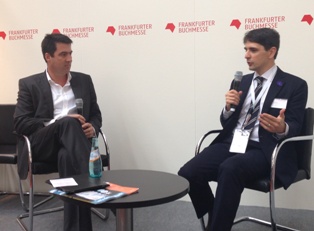 |
| Charlie Redmayne with Ed Nawotka |
"I don't think I want to be creating products that are morally objectionable," said Charlie Redmayne, CEO of HarperCollins UK, during a discussion with Publishing Perspectives editor-in-chief Edward Nawotka. After mentioning that the recently released video game Grand Theft Auto V had brought in approximately $1 billion in 24 hours, Nawotka had wondered if Harper might ever consider turning one of its thriller franchises into a "potentially morally objectionable" interactive experience as it continues to experiment in creating new forms of digital content. Redmayne continued: "Nor do I want to go into the market and take on game developers. What I'm talking about is taking reading experiences and showing how they have resonance and importance on different devices and how the functionality of devices can change those experiences."
Later in the discussion, Redmayne also commented on the meteoric rise of self-publishing and how large publishers can compete: "Ultimately, authors have a choice. They have a choice between Harper or Penguin or Random House or publishing themselves.... If we are a publisher and we are taking revenue, we have to justify it by adding value. If we don't add value, authors won't go with us. I think it's about quality. I hope what HarperCollins will do is work with authors that produce content and books of great quality. Our brand on one of those books should make that statement [and] ultimately we pay advances as well. But if the only value we bring is advances, then it's not a good business." --John Mutter and Alex Mutter
 "Every decade, it seems, has featured a major challenge to the independent bookseller. We manage by being very selective. The craft of bookselling lies, not so much in reacting to the marketplace as in developing it by representing, on our shelves, a point of view that sets us apart. As independent booksellers, we build the final plank in the bridge that connects the writer to the reader....
"Every decade, it seems, has featured a major challenge to the independent bookseller. We manage by being very selective. The craft of bookselling lies, not so much in reacting to the marketplace as in developing it by representing, on our shelves, a point of view that sets us apart. As independent booksellers, we build the final plank in the bridge that connects the writer to the reader.... 





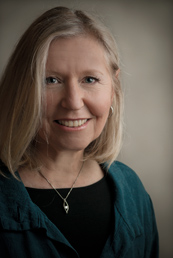 Several months ago you ran a photo gallery of remarkable libraries. One of them was
Several months ago you ran a photo gallery of remarkable libraries. One of them was 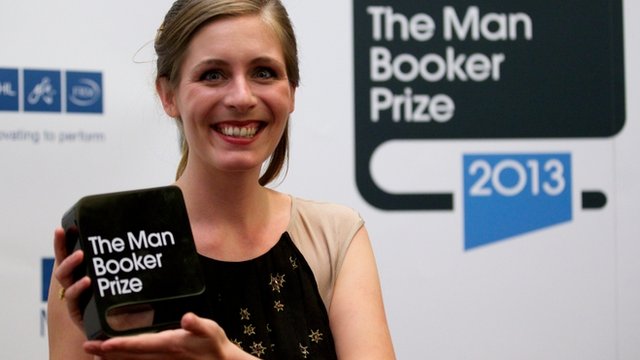




 Scott Schulman has been named president of Rodale Inc. and will assume his new position October 28. Schulman spent more than 13 years at Dow Jones, joining the company in 1999 and more recently serving as president of financial information services for the global Wall Street Journal franchise before taking over the corporate markets group in 2010.
Scott Schulman has been named president of Rodale Inc. and will assume his new position October 28. Schulman spent more than 13 years at Dow Jones, joining the company in 1999 and more recently serving as president of financial information services for the global Wall Street Journal franchise before taking over the corporate markets group in 2010.  Close upon the heels of last week's announcement of a deal to build a
Close upon the heels of last week's announcement of a deal to build a 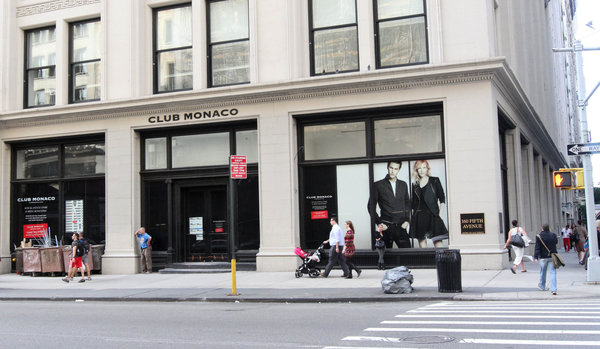
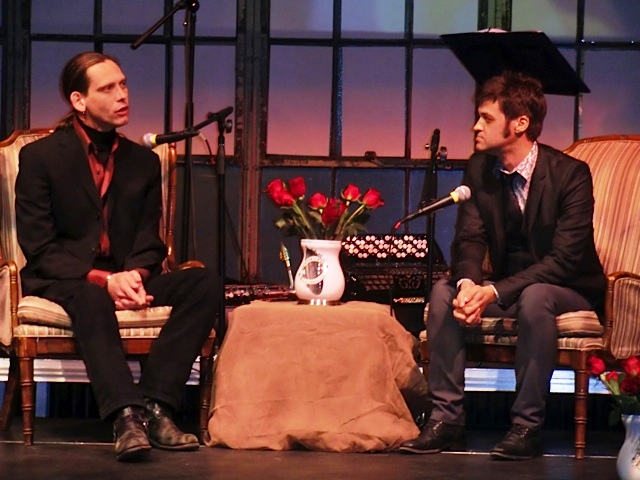
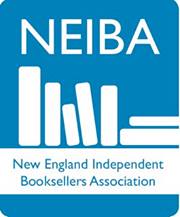 "What do Junot Diaz, Gish Jen, Wally Lamb, Margot Livesey, Wendell Minor and Nathaniel Philbrick have in common?" These are just a few of the authors who have already become
"What do Junot Diaz, Gish Jen, Wally Lamb, Margot Livesey, Wendell Minor and Nathaniel Philbrick have in common?" These are just a few of the authors who have already become 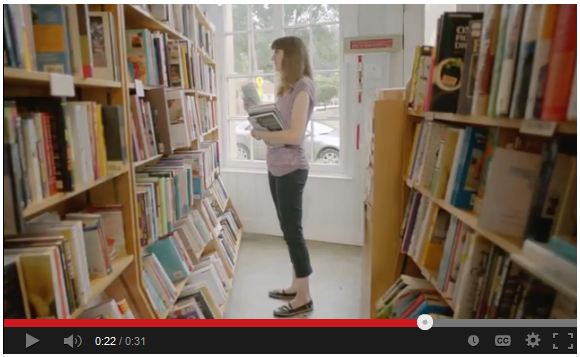
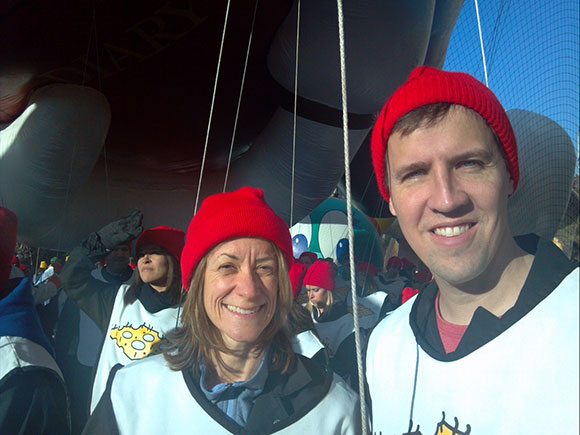
 The Best American Infographics
The Best American Infographics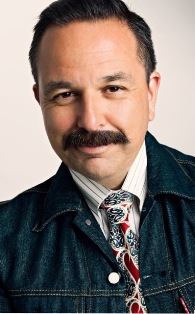
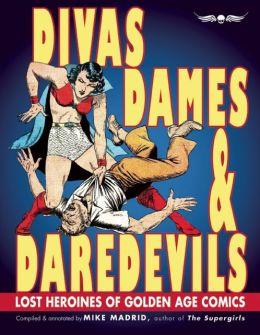 Book you're an evangelist for:
Book you're an evangelist for: Having explored the musical talents of landlubbing creatures in What Animals Really Like, Fiona Robinson turns her attention to artistic-minded ocean-dwellers in this funny and touching tale.
Having explored the musical talents of landlubbing creatures in What Animals Really Like, Fiona Robinson turns her attention to artistic-minded ocean-dwellers in this funny and touching tale.